Photographs: Adnan Abidi/Reuters
In a blog posted on March 15, 2010, Bharatiya Janata Party leader and former Deputy Prime Minister L K Advani wrote that the Indian government is duty bound to share with the people the outcome of its negotiations on 'dirty money'. He urged that the UPA government publish a White Paper on this issue and take the nation into confidence. Following is what Advani wrote in his blog:
When in the year 2008, the BJP first raised the issue of Indian money stashed abroad in Swiss banks, or other tax havens, we were ridiculed by Congress party spokesmen.
Why did you not pursue the matter when the NDA (National Democratic Alliance) was in office for six years, they asked. Prime Minister Dr Manmohan Singh himself described it as an election stunt.
I feel happy therefore that for the first time in the history of the Indian Parliament, the President's Address itself has referred to this matter and told the Joint Session (of Parliament): "India is an active part of the global efforts to facilitate exchange of tax information and take action against tax evaders."
...
Indian wealth stashed abroad: What Advani says
Image: President Pratibha Patil touches a display of tulips inside the famous Mughal Garden.Photographs: Vijay Mathur/Reuters
In Parliament, both the prime minister and finance minister have not only conceded the significance of the issue but affirmed that the government is proactively pursuing the issue, and negotiating with twenty countries for exchange of information about Indian nationals who have hoarded their tax-evaded, or ill-earned, wealth abroad.
The country, however, will not remain satisfied with just affirmations and announcements.
Ever since the BJP has raised this matter two years back, Congress leaders have been pooh-poohing the estimates of Indian wealth abroad made by the BJP Task Force which studied the matter. A senior Congress minister said these estimates were based on obscure sources on the Internet.
...
Indian wealth stashed abroad: What Advani says
Image: Ajit Doval, S Gurumurthy, R Vaidyanathan, Mahesh JethmalaniThe Task Force set up by the BJP comprised S Gurumurthy (chartered accountant and investigative writer, Chennai); Ajit Doval (security expert, New Delhi); R Vaidyanathan (Professor of Finance, Indian Institute of Management, Bangalore); and Mahesh Jethmalani (senior lawyer, Mumbai).
This Task Force, after studying various sources which had dealt with this subject, estimated that Indian wealth parked in foreign tax havens could be anywhere between Rs 25 lakh crore (Rs 25 trillion) and Rs 70 lakh crore (Rs 70 trillion)!
It is significant that in a front page coverage of the prime minister's speech in Parliament last week, in which he mentioned that India had completed its discussions with twenty countries including Switzerland, a leading daily of Mumbai also gave some estimates of Indian wealth abroad which approximates to what the BJP Task Force had said.
The daily -- DNA of Mumbai (March 6, 2010) -- reported: 'While no official data is available on the quantum of such funds parked in tax havens like Switzerland, it is estimated that such black money held by Indians nationals could be worth $140 billion (That is more than Rs 638,000 crore!).
. . .
Indian wealth stashed abroad: What Advani says
Image: The logo of Swiss bank UBS is seen at the office at the Bahnhofstrasse in Zurich. Inset, Hasan Ali.Photographs: Christian Hartmann/Reuters
So long as the West-dominated world economy was doing well for the United States and other Western nations, the entire world, including India, was reconciled to the banking secrecy of these tax havens. They could do nothing about the laws of these countries.
But the recent global economic crisis made not only US President Obama, but also several European countries like the United Kingdom, France and Germany change their attitude, and join hands to make a determined effort to have banking secrecy laws in these countries changed.
Last year Washington forced the Swiss banking giant USB to disclose the names of 4,450 American clients suspected of hiding assets in Switzerland.
Incidentally, I may mention that a writ petition in respect of Indian monies secreted in Swiss banks, et cetera is pending in the Supreme Court and in this petition there is specific mention of a Pune stud farm owner, one Hassan Ali Khan, who had deposited a massive amount in Switzerland's UBS Bank.
It is gathered that the concerned bank has confirmed this, but Indian authorities have not been able as yet to satisfy the Swiss government's demand for proper documentation!
. . .
Indian wealth stashed abroad: What Advani says
Image: Sonia Gandhi (C) speaks with Finance Minister Pranab Mukherjee (L) as India's Prime Minister-elect Manmohan Singh watches.Photographs: B Mathur/Reuters
I had first raised this matter with Dr Manmohan Singh after Germany publicly declared that they had received from Liechenstein a list of German account holders in that tax haven, and the list happened to include some Indian names also. They were willing to share this with India, if officially asked.
It is understood that a list of fifty names have since been received by our government. The Indian government has refused to disclose these names on the plea that Germany has imposed certain legal hurdles on such disclosure.
It is rather odd that Germany has released its own list and yet wants to ensure that the Indian names remain under wraps. Or is it our own reluctance?
Now the government has formally told Parliament that negotiations have been completed with twenty countries, including Switzerland.
. . .
Indian wealth stashed abroad: What Advani says
I believe that events have reached the present pass principally because the BJP made this issue an election issue.
I felt happy that during the election campaign this matter was hotly debated among the people. Sanyasis like Swami Ramdevji would invariably refer to it in his sermons.
In an article published by Financial Times, under title 'India's Curse of Black Money', Raymond Baker, director, Global Financial Integrity, wrote: 'India has shown that this issue resonates with voters. Politicians in other developing democracies would be wise to take note.'
I wish to stress that the government is duty bound to share with the people the outcome of their negotiations with the twenty countries.
I urge that a White Paper be published on this issue, and the nation be taken into confidence.

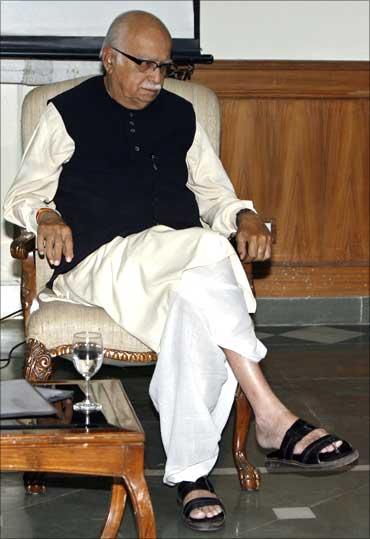
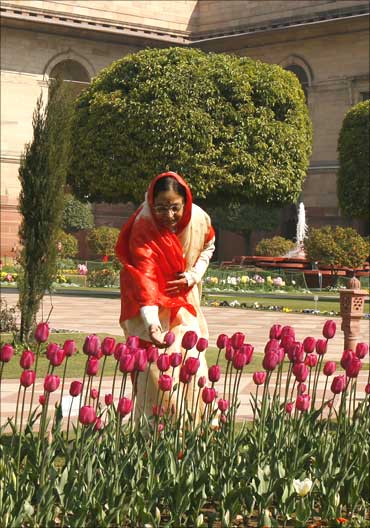
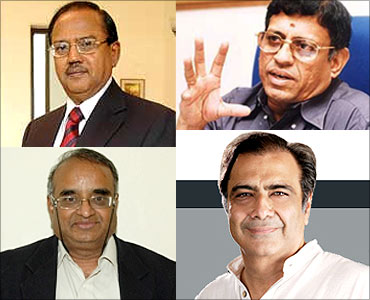
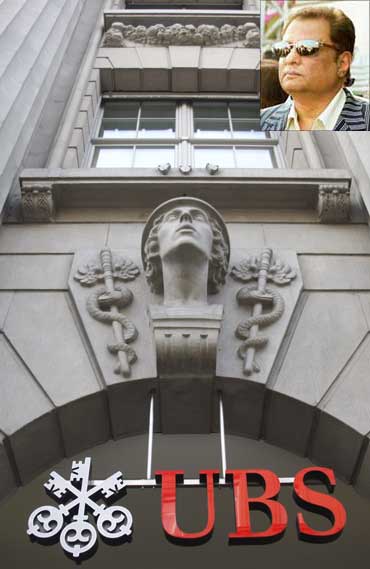
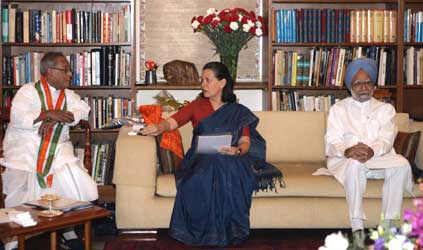

article